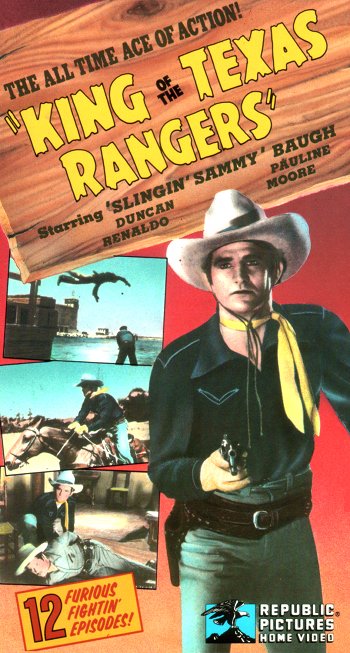King of the Texas Rangers
and
Directors: John English, William Witney
Writers: Ronald Davidson, Norman S. Hall,
William Lively, Joseph O'Donnell, Joseph F. Poland
Cast:
- Sammy Baugh — Tom King Jr.
- Neil Hamilton — John Barton
- Pauline Moore — Sally Crane
- Duncan Renaldo — Pedro Garcia
etc.
12 episodes
215 minutes
Crime on the border, sabotage in the Texas oil fields
King of the Texas Rangers is one of the best of the movie-theater Western serials, for which Republic Pictures enjoyed a good reputation. The twelve-episode film serial resembles a novel serialized in magazine issues, or a television season. A serial's episodes ran in theaters for a week each, between showings of the current feature film. Each installment of King of the Texas Rangers opens with a quick recap of the story so far, then repeats the cliffhanger scene cut off in mid-gasp of the audience at the very end of the previous episode — which in the new episode flows smoothly onwards. In this collected version, the structure isn't too distracting to watch straight through.
Note that the first word in our film's title is a man's name, not a royal designation. The title echoes similar ones, such as Talbot Mundy's famous adventure novel King of the Khyber Rifles (1916), in which another "King" is the fictional hero's name. The Texas Rangers of course are a real law force, just as the Khyber Rifles are a real regiment.
 The main cast of King of the Texas Rangers is good, perhaps not least for appearing and acting more natural than slick. Sammy Baugh was an all-time great football star in real life, and plays Tom King, Jr. as a regular guy who is given a tough job and handles it heroically, with great adaptability and athleticism. Ranger King is not riddled with anxieties, nor is he a polished man-about-town. Baugh is not a pro actor, but does a good job; his believable characterization is a major factor in making the often-spectacular adventures look real.
The main cast of King of the Texas Rangers is good, perhaps not least for appearing and acting more natural than slick. Sammy Baugh was an all-time great football star in real life, and plays Tom King, Jr. as a regular guy who is given a tough job and handles it heroically, with great adaptability and athleticism. Ranger King is not riddled with anxieties, nor is he a polished man-about-town. Baugh is not a pro actor, but does a good job; his believable characterization is a major factor in making the often-spectacular adventures look real.
Pauline Moore plays Sally Crane, a brave newspaperwoman. Neil Hamilton plays John Barton, a man of deepening mystery. Duncan Renaldo plays Mexican lieutenant Pedro Garcia. (Renaldo later gained fame playing The Cisco Kid for movies and television.)
The story setting is the countryside along the U.S.-Mexican border, ranches and small towns and dusty country roads, focusing on the importance of the Texas oil fields. When the serial first ran in theaters in 1941, World War II was well under way in Europe and East Asia, America was maneuvering but not yet officially in the war. We are reminded of the national value of oil, essential to our war-fighting potential (should we enter the war) and even to our survival.
Through its heroes Ranger King and Lieutenant Garcia, the film emphasizes cross-border friendship and informal alliance, American and Mexican law enforcement working together against criminals and even against potential overseas enemies of both countries. Cooperation is a basic theme, ideas of neighborliness no doubt reinforced by the original audience's appreciation of the still-active Monroe Doctrine against European interferences in the Americas, and recollection of the very topical Zimmerman Telegram of January 1917 in which Imperial Germany urged Mexico to go to war against America.
King of the Texas Rangers is well-written and well-plotted adventure, marking its advantage over many contemporary serials and too many films of any time which are plagued with idiot plots. (A technical term, signifying that a plot is kept in motion only by all the characters being idiots.)
We are furnished law-enforcement mysteries, learning along the way that seemingly small-time criminal actions are parts of a significant threat; the film educates the audience's naivete along with that of the good guys in the movie.
There is fast action and suspense in every episode: lots of confrontations, leading to fistfights or gunfights and/or escapes. A lot of the action involves complex situations: adventures and situations flow together, growing out of the fundamental conflict. A built-in theme is the importance of transport in empty lands: lots of time on horseback, chases via horseback, auto, speedboat, and airplane. Each episode breaks off thrilling action — sometimes with literal cliff-hangers — ensuring you can't wait to see the next episode.
King of the Texas Rangers is a classic Western adventure serial and still great fun to watch.
© 2011 Robert W. Franson
and David H. Franson
| Troynovant, or Renewing Troy: | New | Contents | |||
| recurrent inspiration | 200 Recent Updates | |||
|
www.Troynovant.com |
||||
|
Feature Films: Queen Mab's ride |
||||
| Strata | Regions | Personae |
|
|||